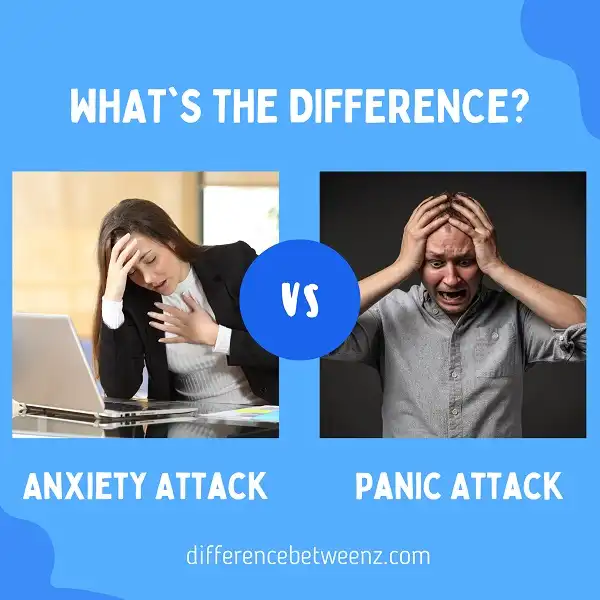Did you know that there is a big difference between anxiety and panic attacks? Anxiety is characterized by ongoing worry, while panic attacks are sudden episodes of intense fear. If you’re not sure whether you’re experiencing an anxiety attack or a panic attack, keep reading for some key differences.
What is an Anxiety Attack?
- Anxiety attacks, also called panic attacks, are episodes of intense fear or discomfort that can last for several minutes. Anxiety attacks typically peak within 10 minutes and may occur with or without warning. Some people experience only a few anxiety attacks in their lifetime, while others have them more frequently. Anxiety attacks usually occur in response to a specific trigger, such as a feared object or situation.
- However, it is also possible to have an anxiety attack without a clear trigger. During an anxiety attack, you may experience physical symptoms such as a racing heart, sweating, trembling, shortness of breath, or dizziness. You may also feel like you are going to faint or lose control of your body. Anxiety attacks can be extremely distressing and may lead to avoidance of trigger situations or places.
- If you experience frequent or severe anxiety attacks, you should talk to your doctor as they may indicate an underlying condition that needs treatment. Anxiety attacks are not dangerous, but they can be very uncomfortable. If you think you are having an anxiety attack, sit down and try to focus on your breathing. Taking slow, deep breaths can help to calm your body and ease your symptoms. Remember that anxiety attacks usually pass within a few minutes and you will eventually feel better.
What is a Panic Attack?
A panic attack is a sudden feeling of overwhelming anxiety and fear. It can come on very suddenly and can be very intense. Physical symptoms of a panic attack may include a racing heart, shortness of breath, sweating, trembling, and a feeling of impending doom. Many people who have a panic attack feel like they are going to die or lose control. Panic attacks can be very frightening.
They usually last for a few minutes but may go on for longer. Some people have just one panic attack in their lifetime, while others have them frequently. Having a panic attack does not mean you are crazy or weak. Panic attacks are a real medical condition that can be treated by a mental health professional. If you think you might be having a panic attack, see your doctor or a mental health professional for help.
Difference between Anxiety and Panic Attacks
- Anxiety and panic attacks are often confused because they share some similar symptoms. Anxiety is a feeling of unease, such as worry or fear, that can be mild or severe. Anxiety is a normal reaction to stress and can be beneficial in some situations. It can help you to stay alert and focused and motivated to solve problems. However, when anxiety occurs frequently and interferes with daily activities, it may be a sign of an anxiety disorder.
- Panic attacks are sudden periods of intense fear or discomfort that reach a peak within minutes. Some people may feel like they are having a heart attack, losing control, or going crazy. Panic attacks often occur in response to a trigger, such as a specific situation or object. Panic attacks are brief and usually peak within 10 minutes, although some symptoms may last longer.
- While both anxiety and panic attacks can be unpleasant and disruptive, they are different experiences. Anxiety is a sustained feeling of unease, while panic attacks are sudden episodes of intense fear or discomfort. Anxiety disorders are more common than panic disorders, but both conditions can be treated effectively with therapy and medication.
Conclusion
Anxiety and panic attacks are often confused for one another, but there is a clear distinction between the two. Understanding the difference can help you get the help you need. If you think you may be suffering from an anxiety disorder or panic attack, please seek professional help.


